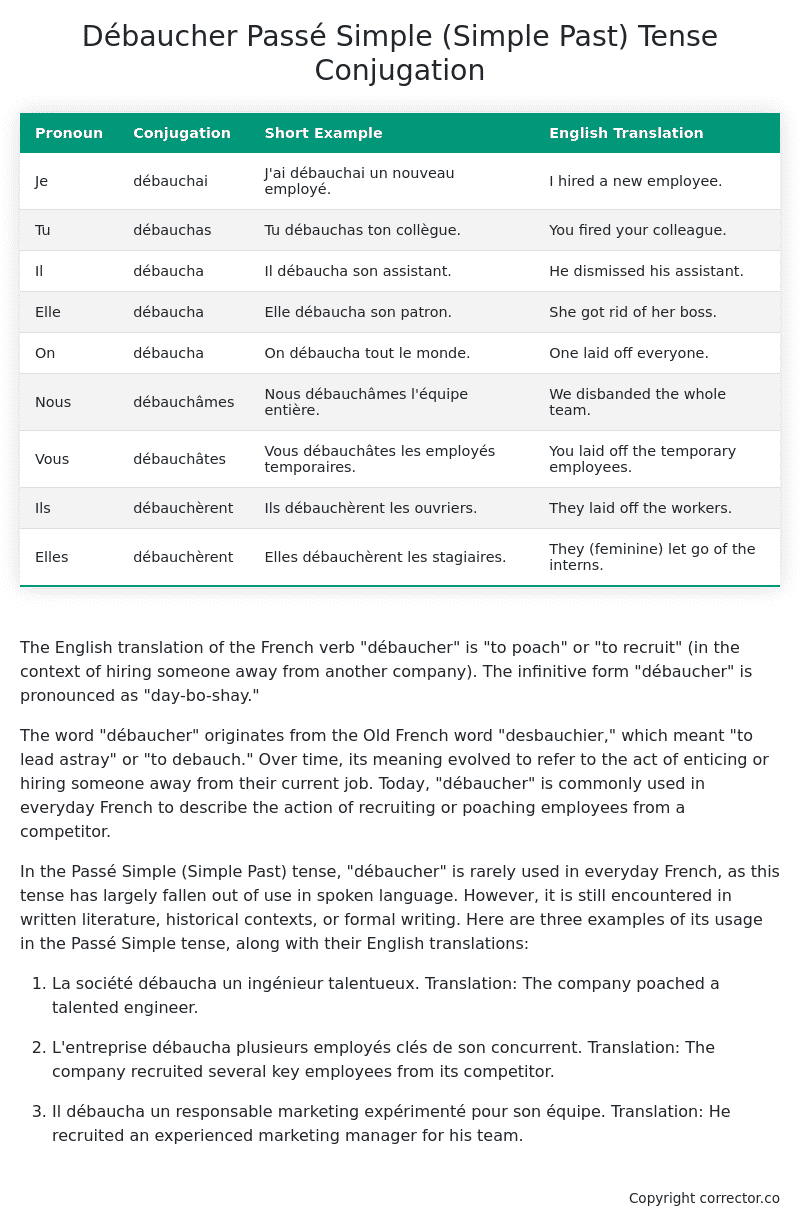Passé Simple (Simple Past) Tense Conjugation of the French Verb débaucher
Introduction to the verb débaucher
The English translation of the French verb “débaucher” is “to poach” or “to recruit” (in the context of hiring someone away from another company). The infinitive form “débaucher” is pronounced as “day-bo-shay.”
The word “débaucher” originates from the Old French word “desbauchier,” which meant “to lead astray” or “to debauch.” Over time, its meaning evolved to refer to the act of enticing or hiring someone away from their current job. Today, “débaucher” is commonly used in everyday French to describe the action of recruiting or poaching employees from a competitor.
In the Passé Simple (Simple Past) tense, “débaucher” is rarely used in everyday French, as this tense has largely fallen out of use in spoken language. However, it is still encountered in written literature, historical contexts, or formal writing. Here are three examples of its usage in the Passé Simple tense, along with their English translations:
-
La société débaucha un ingénieur talentueux.
Translation: The company poached a talented engineer. -
L’entreprise débaucha plusieurs employés clés de son concurrent.
Translation: The company recruited several key employees from its competitor. -
Il débaucha un responsable marketing expérimenté pour son équipe.
Translation: He recruited an experienced marketing manager for his team.
Table of the Passé Simple (Simple Past) Tense Conjugation of débaucher
| Pronoun | Conjugation | Short Example | English Translation |
|---|---|---|---|
| Je | débauchai | J’ai débauchai un nouveau employé. | I hired a new employee. |
| Tu | débauchas | Tu débauchas ton collègue. | You fired your colleague. |
| Il | débaucha | Il débaucha son assistant. | He dismissed his assistant. |
| Elle | débaucha | Elle débaucha son patron. | She got rid of her boss. |
| On | débaucha | On débaucha tout le monde. | One laid off everyone. |
| Nous | débauchâmes | Nous débauchâmes l’équipe entière. | We disbanded the whole team. |
| Vous | débauchâtes | Vous débauchâtes les employés temporaires. | You laid off the temporary employees. |
| Ils | débauchèrent | Ils débauchèrent les ouvriers. | They laid off the workers. |
| Elles | débauchèrent | Elles débauchèrent les stagiaires. | They (feminine) let go of the interns. |
Other Conjugations for Débaucher.
Le Present (Present Tense) Conjugation of the French Verb débaucher
Imparfait (Imperfect) Tense Conjugation of the French Verb débaucher
Passé Simple (Simple Past) Tense Conjugation of the French Verb débaucher (You’re reading it right now!)
Passé Composé (Present Perfect) Tense Conjugation of the French Verb débaucher
Futur Simple (Simple Future) Tense Conjugation of the French Verb débaucher
Futur Proche (Near Future) Tense Conjugation of the French Verb débaucher
Plus-que-parfait (Pluperfect) Tense Conjugation of the French Verb débaucher
Passé Antérieur (Past Anterior) Tense Conjugation of the French Verb débaucher
Futur Antérieur (Future Anterior) Tense Conjugation of the French Verb débaucher
Subjonctif Présent (Subjunctive Present) Tense Conjugation of the French Verb débaucher
Subjonctif Passé (Subjunctive Past) Tense Conjugation of the French Verb débaucher
Subjonctif Imparfait (Subjunctive Imperfect) Tense Conjugation of the French Verb débaucher
Subjonctif Plus-que-parfait (Subjunctive Pluperfect) Tense Conjugation of the French Verb débaucher
Conditionnel Présent (Conditional Present) Tense Conjugation of the French Verb débaucher
Conditionnel Passé (Conditional Past) Tense Conjugation of the French Verb débaucher
Conditionnel Passé II (Conditional Past II) Tense Conjugation of the French Verb débaucher
L’impératif Présent (Imperative Present) Tense Conjugation of the French Verb débaucher
L’impératif Passé (Imperative Past) Tense Conjugation of the French Verb débaucher
L’infinitif Présent (Infinitive Present) Tense Conjugation of the French Verb débaucher
L’infinitif Passé (Infinitive Past) Tense Conjugation of the French Verb débaucher
Le Participe Présent (Present Participle) Tense Conjugation of the French Verb débaucher
Le Participe Passé (Past Participle) Tense Conjugation of the French Verb débaucher
Struggling with French verbs or the language in general? Why not use our free French Grammar Checker – no registration required!
Get a FREE Download Study Sheet of this Conjugation 🔥
Simply right click the image below, click “save image” and get your free reference for the débaucher Passé Simple tense conjugation!

Débaucher – About the French Passé Simple (Simple Past) Tense
Formation
Usage
Narration
Historical Context
Interactions with other tenses
Passé Composé
Imparfait
Conditional and Subjunctive
Summary
I hope you enjoyed this article on the verb débaucher. Still in a learning mood? Check out another TOTALLY random French verb conjugation!


